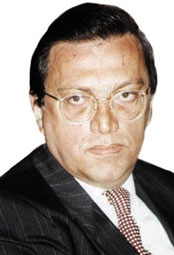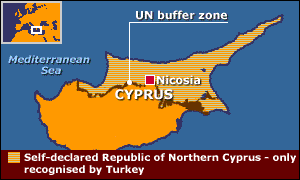22
February 2002
![]()
2. "EU must give Turkey a specific date", at the end of this year, the EU will reward all of its candidates. The EU should know that it will lose us if, while embracing the others, it gives Turkey no signal at all regarding the accession talks.
3. "Turkey should allow Kurdish education - deputy PM", Deputy Prime Minister Mesut Yilmaz, who oversees relations with the EU, said on Wednesday Turkey should allow some Kurdish-language education and that lifting the ban would not erode national unity.
4. "Prime Minister Ecevit says EU membership is a national matter", Prime Minister Bulent Ecevit said on Thursday, ''membership to the European Union (EU) is a national matter. It is not the matter of only government or coalition partners. It is directly a matter of our nation and state.''
5. "Cyprus ordeal moves toward resolution", in today's clamorous world, where trouble seems only to spread, one long ordeal is moving quietly toward resolution.
6. "MHP is not opposed to the EU: Bahçeli", the Deputy Prime Minister queries why the question of abolishing capital punishment has been brought up at this time.
1. - Turkish Daily News - "Army to Ecevit: Don't act in haste on death penalty":
Note from military 
In a note to the Prime Ministry, Foreign Ministry, Justice
Ministry and the EU General Secretariat, the Office of the Chief of
General Staff advises the final decision on this 'sensitive subject'
be withold until after the scheduled March 19 meeting of the EU on Turkey
ANKARA / Mete Belovacikli
The Turkish military has reportedly advised Prime Minister Bulent Ecevit not to act in haste on the lifting of the death penalty and hold on the final decision on this "sensitive subject" until after the scheduled March 19 meeting of the EU on Turkey.
According to well-placed political sources while debate continues among the political parties on the lifting of the death penalty, the Turkish Armed Forces have reportedly clarified its position on the issue and the Office of the Chief of General Staff has sent a "note" on the issue to the Prime Ministry, as well as to Justice Ministry, the Foreign Ministry and the EU General Secretariat.
According to sources, in the note it was stressed that the military believed an amendment in Constitution was not required in order to lift the death penalty and that an amendment only in the Penal Code would suffice. Still, the sopurces said, even for the amendment to be made in the Penal Code, the military underlined that it was of the opinion that it would be better if Turkey waited until after the EU meets on march 19 to review the progress made in Turkey in fulfilling the short-term goals specified in the EU National Program.
The note underlined that in the constittutional amendments made last year Turkey has scrapped death penalty from its constitution, excluding crimes of terror and at times of war or imminent threat of war and thus arrangements to be made in the Penal Code Article 125 "within that guidelines" would be enough.
Wait for EU meeting
The note sent by the Office of the Chief of General Staff to the Prime Ministry also underlined that it woyuld be "preferable" if an arrangement further than the scope of the constitutional amendments made last year was decided only after the March 19 meeting of the EU as scrapping the death penalty was not among the short-term pledges Ankara made in its National rogram. Ankara, in its National Program, had pledged EU to scrapp the death penalty in the "medium-term."
Issue at MGK meeting
According to political sources, the lifting of the death penalty would be on the agenda of the February meeting of the National SDecurity Council. The sources said whether the EU includes or xontinues to exclude the separatist Kurdistan Workers' Party and the clandestine Revolutionary Peoples' Liberation Front (DHKP-C) gang in its list of terrorist groups, wilkl be decisive in MGK discussions on the issue.
Ecevit: Death penalty a national problem
Talking to reporters Thursday after an hour-long meeting with Foreign Minister Ismail Cem and Deputy Chief of General Staff Gen. Yasar Buyukanit, Prime Minister Bulent Ecevit said lifting of the death penalty was not the probŸlem of the government only. He said the issue was a matter of clearing Turkey's EU accession path and in that scope was a national problem of Turkey.
The prime minister said he believed a way out would be eventually found to the problem as there was almost a consensus in the country on the need of lifting the death penalty.
Izgi says death penalty not a handicap for EU accession
Parliament speaker Omer Izgi, meanwhile has said that Turkey's lifting of the death penalty, except for crimes of terrorism, at times of war or in the imminent threat of war, will not be a handicap for the EU accession aspirations of the country.
Speaking with reporters during a visit to the Kecioren Pensioners' Home to celebrate the forthcoming Eid ul-Adha (Feast of Sacrifice) religious holiday of the senior citizens, the Parliament speaker defended that Greece and France had also retained the death penalty for times of war when they lifted capital punishment, and therefore Turkey would not be the sole European country to lift death penalty except in times of war.
Refuting claims that in order to lift the death penalty Turkey would be required to amend the Constitution, Izgi stressed that there were no clauses in the Turkish Constitution that defined the death penalty, and that all the references in the national charter to capital punishment were regarding how it would be issued and executed. He said that with the amendments made to the Constitution last year it had been defined for what crimes the death penalty could not be issued.
He said the death penalty issue could be resolved by making amendments only to the Penal Code. Izgi, reiterating that with last year's amendments to the Constitution, Parliament had defined for what crimes the death penalty could not be issued, and underlined that the task of Parliament was now to decide for what crimes the capital penalty could be issued.
He said deciding on the death penalty would be the most difficult task of Parliament, and that in amending the Constitution, Parliament had decided that the death penalty could be issued only for crimes of terrorism and at times of war or imminent threat of war. Now, he said, while there was such a stipulation in the Constitution, lifting death penalty all together from the Penal Code would be a very difficult decision for Parliament.
Currently, the Turkish Penal Code states that crimes against the State, crimes against the security forces of the state, and crimes against individuals could be punishable with the death sentence. The death sentence is classified in the Penal Code as the heaviest penalty that can be issued by the courts and can be carried out only after the approval of Parliament and endorsement by the president.
The crimes against the State that are currently punishable by death are covered by Articles 125 to 137 of the Penal Code. These articles include crimes such as separatism, treason, collaboration with enemy forces, leading enemy forces, assisting enemy forces in times of war, engaging in espionage activities, disclosure of secrets or issues prohibited by the government at times of war, and trying to change the constitutional order of the country by use of force.
The crimes against the security forces of the State are covered in Penal Code Articles 146 to 156. According to these articles, armed rebellion, armed campaigns to change the established order, Constitution or regime of the country, engaging in an armed campaign in a manner rendering difficult the functioning of the Council of Ministers, inciting violence and uprising, attempting assassination of leaders of the country, and other such crimes, are covered in these articles as crimes punishable by death.
Penal Code Article 450, on the other hand, defines the crimes against individuals that can be punishable with the death penalty. According to this article, murder under certain conditions could be punishable by death.
In the Military Penal Code, on the other hand, more than a dozen articles define under what conditions "military personnel" could be sentenced to death.
In the mean time, Article 30 of the Law against Smuggling, defines that if a government official, soldier or person assisting government forces, is killed in attempting to prevent smuggling or in the pursuit of smugglers, the perpetrators could be sentenced to death.
Since 1985, Turkey has been applying an undeclared moratorium
on the issue and Parliament has not handled any of the some 120 death
penalty decisions in over 60 files. If Turkey lifts the death penalty
but retains it only for crimes of terrorism, according to Parliament
sources, only the death files of 46 convicts will remain at the Turkish
legislature, and all other death penalty files would be commuted to
life imprisonment without parole. ![]()
2. - Hurriyet - "EU must give Turkey a specific date":
Opinion by M. Ali Birand
At the end of this year, the EU will reward all of its candidates.
The EU should know that it will lose us if, while embracing the others,
it gives Turkey no signal at all regarding the accession talks. The
'adaptation to EU' bills would be shelved and, quite possibly, the Cyprus
and Aegean problems would be affected by the situation
The final quarter of 2002 will see vitally important developments from the standpoint of Turkey's relations with the European Union. All the signs attesting to it are already visible.
The impression I got during my talks with EU commissioner for enlargement Gunter Verheugen and his team, is that they too are aware of this.
Acting like Santa Claus, the EU will distribute to the candidate countries their gifts.
The accession of the 10 countries will be declared to the public. The agreements making them full members will be signed with fanfare.
That will leave Bulgaria and Romania, who have not yet fulfilled the economic criteria, and they will be given a timetable. They will be told that they would be able to become full members at a specific date if they fulfill the criteria according to the deadlines specified by the EU.
In other words, everybody will be given satisfaction.
That will leave only Turkey.
If Turkey will be given no pledge, no perspective, Turks -- I among them -- will be up in arms.
Those circles, whose aim is to see Turkey join the EU, will be greatly disappointed. No initiative will be left towards adapting Turkey to the EU's political criteria.
The anti-EU circles will have gained an extremely effective opportunity. No one would be able to come up and defend the "adaptation to the EU's political criteria" bills. On the contrary, there would be growing pressure not to implement the bills of that kind that have already been passed.
A Europe left alone, without a goal, would start giving the EU the cold shoulder. The file would be shelved, and those who want Turkey to be a country of darkness would win.
There would be no more excitement or impetus towards the resolution of the Cyprus and Aegean issues.
The same circles would reappear on the scene, reiterating their old rhetoric. They would say that "strict laws" would be needed "to prevent the country from splitting up." More importantly, they would say, "There is no possibility of our becoming a full member. So, why are we making an effort on the Cyprus issue?" They would make a special effort to cling to the Aegean card in their hands..
If the EU does not want all that, the EU will set a specific date for the start of accession talks with Turkey, specifying the conditions under which the talks can begin.
Such an approach would make Turkey more eager to comply with both the political and economic criteria. It would cause excitement among the people.
The announcement of the date on which the accession talks would begin, would affect not only the domestic developments, but also Turkey's foreign economic and political reactions as a whole. Turkey's international rating would be upgraded and that would accelerate the developments.
EU starts seeing the gravity of the situation
Seen from the EU standpoint, giving Turkey a specific date will not be an easy decision at all. This is because this would mean Turkey getting one step closer to the EU. In other words, this would elicit objections from those EU members who cannot yet see Turkey as a "full member."
Yet, at the end of 1999, they had given the same treatment to Bulgaria and Romania. To a country that was late in complying with the political criteria they said, "If you eliminate these or those shortcomings by the deadline we are setting, we will start accession talks with you on this date." Thanks to that initiative, Romania and Bulgaria managed to adapt to the criteria and were able to start the accession talks.
The EU delegation received that message in a crystal clear manner in Ankara last week.
In fact they too are aware of the gravity of the situation. They believe that Turkey must definitely be given something, given a certain perspective. However, they do not know yet what exactly can be done. Hence the vital importance of the next few months. If Turkey manages to take further steps regarding the "adaptation bills" and if, especially, it explains the situation effectively to the member countries, persuades them and presses hard, Turkey can obtain a specific date.
The key: death penalty, private Kurdish teaching and broadcasting
The most important "adaptation bills" that would stir the EU into action about giving Turkey a date by the end of the current year, would be those involving the abolishment of the death penalty and the lifting of the ban on teaching of and the broadcasting in languages other than the native tongue.
I think it would be useful to underline one thing yet another time. In yesterday's article I referred to Motherland Party (ANAP) leader, Deputy Prime Minister Mesut Yilmaz's statements in which he had corrected a misunderstanding. Later, I asked the EU officials about it, and I received the same answers.
We keep writing that the EU wants freedom of "education and broadcasting in Kurdish," and, with this assumption, we claim that the EU intends to split up Turkey. Yet, this is a big mistake, and the Nationalist Movement Party (MHP), a member of the ruling coalition, is still making this mistake.
The EU has not said anything to Turkey on the Kurdish language issue.
The Copenhagen criteria envisage that EU countries and the candidates must lift the ban on the "teaching of and the broadcasting in languages other than the native tongue" and not "education in those languages."
It is out of the question for the State high schools or universities to provide "education" in those languages as if those were the native tongue.
Having been sensitized on this issue, we refer to this as "the EU's imposing on us its will on the Kurdish language issue." As if that were not enough, we claim that this is an attempt to bring about education in Kurdish as well, as if it were the native tongue.
This is not so at all. Either we are deceiving ourselves, or we are deliberately telling the public a lie.
The EU knows about Turkey's sensitivities and intends to act in a flexible manner. So it finds it difficult to understand the way Turkey exaggerates this issue unilaterally.
They stress that they would deem it sufficient to lift the ban on the opening of privately-owned Kurdish teaching courses. Despite this, "different" public interpretations and resistance, continue.
By trying the formulas Mesut Yilmaz has mentioned, a solution can be found.
In short, Turkey's path is not obstructed. All we need
is a little action so that we can produce solutions, while protecting
our basic interests. ![]()
3. - Reuters - "Turkey should allow Kurdish education - deputy PM":
ANKARA
Deputy Prime Minister Mesut Yilmaz, who oversees relations with
the EU, said on Wednesday Turkey should allow some Kurdish-language
education and that lifting the ban would not erode national unity.
The European Union, which Turkey wants to join, has urged Ankara to improve cultural rights for its 12 million Kurds, but authorities fear greater freedom could encourage restive Kurds to demand more autonomy.
"People should be able to learn their parents' language if they want to," Yilmaz said in an interview with NTV television. "If it's by private means outside of official (schools), the state shouldn't block this and shouldn't forbid it."
He added, however, that Turkish should remain the official language in state schools. Under current laws, Kurdish cannot be taught in private language schools or community groups.
Yilmaz's remarks, made in an interview with NTV television, differed sharply with those by Prime Minister Bulent Ecevit, who has said Kurdish instruction is "unacceptable" and blamed separatists for organising a campaign for the ban be lifted.
Last month police detained hundreds of parents and students who signed petitions calling for Kurdish teaching.
The Kurdistan Workers Party (PKK) has waged an armed struggle for self-rule that has claimed more than 30,000 lives since 1984. Violence dropped off sharply with the 1999 capture of PKK leader Abdullah Ocalan, who ordered his followers to withdraw from Turkey and seek cultural rights for Kurds.
Asked whether separatists were using the Kurdish-language campaign to divide Turkey, Yilmaz said: "I definitely don't believe this, I do not share these fears."
"I believe just the opposite. By blocking it without
any good reason you serve the PKK's propaganda. When we make this free,
very few people will take advantage of it," he said.![]()
4. - Anadolu Agency - "Prime Minister Ecevit says EU membership is a national matter":
ANKARA
Prime Minister Bulent Ecevit said on Thursday, ''membership to the
European Union (EU) is a national matter. It is not the matter of only
government or coalition partners. It is directly a matter of our nation
and state.''
Prime Minister Ecevit responded to questions of journalists at the Prime Ministery Office.
Question: Have you taken a decision about undertaking command of the Peace Force in Afghpanistan and some expenses?
Answer: We have been assessing the issue and will continue to do so in the future. I cannot give detailed information at this point. At the same time, we cannot take a decision on the issue on our own. The United States and Britain are also interested in the issue of Afghanistan. Also, there are several other relevant countries, the United States and NATO. We ask their opinions. If Turkey will undertake such a mission, it should determine the conditions under which it will carry out its mission in a perfect way. This issue will become clear soon.
Question: Karen Fogg matter has turned into a e-mail crisis. Did Ankara ask the EU to recall Fogg?
Answer: No, we did not make such a request. However, it is a distressing incident. As you know, crimes committed through internet are widespread in the whole world. Legal measures against these crimes could not be taken adequately in any part of the world. Some guarantees are required to this end. Source of the incident in Turkey is not clear. We have still been searching it. The issue was brought to the judgment. We cannot intervene in the judgment. We hope that the incident would come to a conclusion soon.
Question: State Minister and Deputy Prime Minister Mesut Yilmaz said that Fogg's e-mail could be leaked from the EU. What do you think?
Answer: The e-mails could be leaked from anywhere. As I said before the source of this crime is not clear.
Question: You held a telephone conversation with EU Commission President
Romano Prodi. What did he say?
Answer: He expressed the EU Commission's sensitivity. He requested us to pay attention to the issue.
Question: Did Ankara send a message to the EU to express its uneasiness about content of Fogg's e-mails?
Answer: It is a distressing incident. We have been taking all necessary measures.
Question: Did content of Fogg's messages insult the state?
Answer: According to my point of view, it will be not correct to give detailed information, because the issue was brought to the judgment.
Question: Do you think that an anti-EU lobby has been raising its voice in Turkey?
Answer: There are different poinst of view about conditions of the EU membership. For instance, annulment of death sentence is one of the conditions of the EU. However, there are some circles who want Turkey to become a full member of the EU, but cannot be satisfied with the annulment of death sentence. I think it is not correct to describe them as lobby. Meanwhile, annulment of death sentence is a condition for extradition of offenders who are captured in foreign countries. We want measures to be taken to remove obstacles in front of Turkey's EU membership. Membership to the EU is a national matter. It is not the matter of government or coalition partners. It is directly a matter of our nation and state.
Question: Is a constitutional amendment necessary to lift death sentence?
Answer: Jurists have been discussing the issue, but they could not come to a conclusion yet. The Democratic Left Party (DSP) has been opposed to death sentence since 1970s. It is not regarded with recent developments in Turkey. As I said before, annulment of death sentence is a condition of the EU membership. Therefore, we should remove this obstacle soon.
Question: True Path Party (DYP) leader Tansu Ciller said that first file about capital punishment given to Abdullah Ocalan, the head of terrorist organization PKK, should be debated at the parliament, then death sentence should be lifted. What do you think?
Answer: I will not make such a bargain. ![]()
5. - Christian Science Monitor Service - "Cyprus ordeal moves toward resolution":
Opinions: RICHARD C. HOTTELET
WILTON, Conn.
In today's clamorous world, where trouble seems only to spread,
one long ordeal is moving quietly toward resolution.
The island of Cyprus, only the size of Connecticut, has been a huge problem for NATO, Europe and the Middle East. For 40 years, it has been torn apart. Its ethnic Greek majority and Turkish minority have clawed one another in civil war and ethnic cleansing.
Tucked in Turkey's armpit in the eastern Mediterranean, Cyprus has been viewed by Ankara as a major security concern ever since the island gained independence from Britain in 1960. For years, communal strife was the order of the day. In 1974, a military clique in Athens tried to overthrow the government of Greek Archbishop Makarios for the purpose of enosis - uniting Cyprus with Greece. Thirty-five thousand Turkish troops were rushed in to prevent that for all time and to protect the Turkish community.
The force has been there ever since, cutting the island in two, poisoning relations between Greece and Turkey - a perpetual worry for NATO, to which both countries belong, through much of the cold war.
The United Nations has been in Cyprus since 1964, trying to promote peace, patrolling a buffer zone between the two sides, and urging negotiations. But the head of the Turkish community, Rauf Denktash, set up a nominally independent Turkish Republic of Northern Cyprus. It is not recognized by any country except Turkey, while the government of the Greek community is accepted worldwide as the Republic of Cyprus representing the entire island. Denktash long demanded official recognition of his republic before he would talk, and Prime Minister Bulent Ecevit of Turkey loudly supported him, threatening to annex northern Cyprus if the Republic of Cyprus became a member of the European Union. Yet, this is precisely what will happen within the next 18 months.
Turkey, eager to join the EU, cannot keep Cyprus out. And the Turks of Cyprus, isolated and living in poverty, look forward to sharing the benefits of EU membership. The moment of truth is at hand. Ecevit stopped threatening. Denktash, having refused for years to meet his Greek Cypriot counterpart, Glafcos Clerides, has dropped his demand for recognition as a condition of talks. They have been conferring frequently since mid-January.
Yet, an enmity as intense as that between Greek and Turk cannot turn to sweet reason overnight. The negotiators must be stroked and encouraged. Years ago, U.N. Secretary General Kofi Annan assigned one of his ace troubleshooters, Alvaro de Soto of Peru, to live with the problem. He had been midwife to the El Salvador peace settlement. A man of infinite patience, he inspires trust in U.N. impartiality and gives the talks an international presence. The parties, facing a mountain of accumulated grievance and suspicion, need a stable framework.
The fate of some 2,000 Turkish and Greek Cypriots missing in the years of conflict must be cleared up. Nearly 200,000 Greek and more than 60,000 Turkish refugees from past ethnic cleansing must return home or be compensated. The Turks, about 18 percent of the 800,000 population of Cyprus, now hold 37 percent of the land. That must be adjusted. The 35,000 Turkish troops must leave. Would an international force be able to ensure peace?
Governance is a cardinal issue. The U.N. has set the goal of a bi-zonal, bi-communal state. Each community will certainly have cultural autonomy. How will they relate to the new central government of Cyprus? Will there be freedom of movement, land ownership, and investment? Turks fear that the immensely richer, more experienced Greeks might simply buy them out.
Cyprus is a most sensitive domestic issue for both Greece and Turkey. They also have others. Sovereignty and maritime rights in the Aegean Sea are vital for each. After years of nationalist demagogy building walls between them, they are moving closer. Greece, taking the long view, strongly endorsed Turkish membership in the UN. Both are ready to stop snarling and start talking about the Aegean. Their troops have joined in NATO maneuvers. They have agreed to exchange intelligence on terrorism, narcotics, and traffic in refugees.
For many years, the U.S. and others have tried without
success to soften Turkish obstinacy on Cyprus. But American support
for Turkish financial reform, reinforced recently by many billions of
dollars in loans from the International Monetary Fund, may have helped
alter Ankara's mood. As of now, the picture of Cyprus holds real promise.
![]()
6. - NBC - "MHP is not opposed to the EU: Bahçeli":

The Deputy Prime Minister queries why the question of abolishing
capital punishment has been brought up at this time.
The leader of Turkey’s far right Nationalist Movement Party (MHP) has said his party was being unfairly portrayed by being presented as if it was opposed to Turkey’s membership of the European Union.
Speaking ahead of a dinner given for the visiting Kirgizistan President Akayev Wednesday night, Deputy Prime Minister Devlet Bahçeli said his party was being wrongly labelled as being anti-EU.
“The 40 years history of Turkey and EU relations has gained momentum during the 57th government. This was not achieved despite MHP,” he said.
It was the will of the parliament to decide on the abolition of capital punishment, Bahçeli said, adding that this would be achieved after all parties clarified their views over issue. However, Bahçeli questioned what was behind bringing the death penalty onto the Turkey’s political agenda so early, as this was not among the short term targets set by the EU as part of Turkey’s accession process.
“What is the meaning of starting off that debate before the one year term accepted for short term has been completed?’ he asked.
The MHP leader avoided commenting on proposals to allow broadcasting in mother tongue languages, saying he said would do so when the changes to be made to the laws governing the Supreme Board of Radio and Television (RTÜK) were tabled.
The MHP has gone on record as saying that it opposes broadcasting
in languages other than Turkish, the official state language, as it
fears that this could lead to encouraging separatist activity. ![]()